5 Ways Social Media Can Help SEO (even if it’s not a ranking factor!)

How important are social signals for search rankings? Do we have to worry about the number of retweets? Or mentions?
If you’ve been in the digital marketing industry for at least a year, these and other questions might have crossed your mind. But the challenging thing is that the answers are not straightforward, which turns campaign planning and strategizing into a marketer's nightmare.
In this article, I’ll try to shed some light on what we already know about the existing connections between SEO and social media marketing and will try to give you actionable tips on building a healthy and effective strategy for your needs.
Part 1. Fact-check
First, let’s do some fact-checking and quickly recollect all the official statements regarding the correlation of social signals and search rankings. No assumptions — facts only!
December 2010, Matt Cutts: Social signals are a ranking factor.
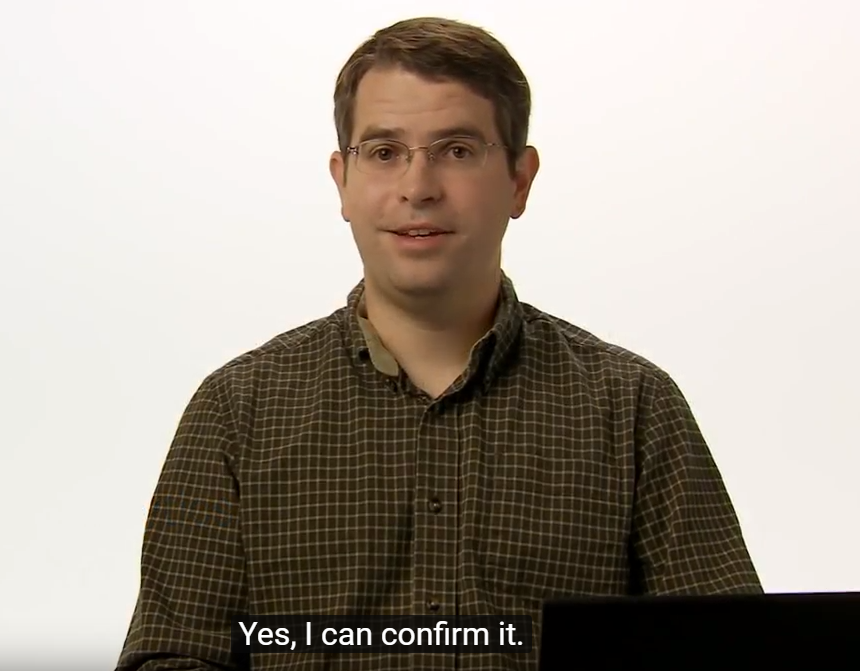
In 2010, Matt Cutts published a video where he clearly declares social signals a valid ranking faсtor:
“We do use Twitter and Facebook links in ranking, as we always have in our web search rankings. But in addition, we're also trying to figure out a little bit about the reputation of an author or a creator on Twitter or Facebook. And let me just give you a little bit of background on that. I filmed a video back in May 2010, where I said that we didn't use that as a signal. And at the time, we did not use that as a signal. But now, we're taping this in December 2010, and we are using that as a signal.”
After watching this video, many marketers thought that social is the new SEO and got crazy about building up social profiles and creating “viral” content.
July 2012, Matt Cutts: Don’t write the epitaph for links yet.
Some SEOs got so obsessed with the idea of social SEO that they even thought social signals would soon completely replace traditional backlinks. It was high time someone explained what was going on. And Matt actually tried to do that at SMX Advanced 2012:
“There's more data being generated on the web compared to any other source of data around the web. And I think the fact is a lot of people think, oh, links are dying, or links are not a democracy, or it's impossible to get links that aren't nofollow, or whatever. And the fact is that's a little bit of a bubble in my opinion within the SEO industry, because if you look at the actual percentage of nofollow links on the web it's a single-digit percentage, and in fact, it's a pretty small single-digit percentage. So there's this perception that yes, everything will go social or links are completely obsolete, and I think it's premature to reach that conclusion. I don't doubt that in 10 years, things will be more social and those will be more powerful signals but I wouldn't write the epitaph for links quite yet.”
The bolded phrase is quite important, in my opinion. Matt sounded pretty optimistic about the increasing impact of social on search. I assume, that was really a part of Google’s strategy at the moment — to incorporate social signals into the ranking algorithm.
January 2014, Matt Cutts: Social signals do not affect rankings.
Yep, things changed drastically over just 2 years!
I think it’s important to emphasize a couple of facts that took place before Matt’s announcement. As Matt mentioned in the video of 2012, Google was blocked from crawling one of the popular social media websites (Twitter) for more than a month. It seemed to be a huge disappointment for Google engineers — they just couldn’t build up the ranking algo based on the data that wasn’t accessible to them. That could be one of the top reasons Google started losing interest in social signals.
And what about the relations with Facebook? Well, they seemed to have gone from bad to worse in 2013 (yup, just a year before Matt’s statement!), when Mark Zuckerberg said: "Our relationship with Google isn't one where the companies really talk."
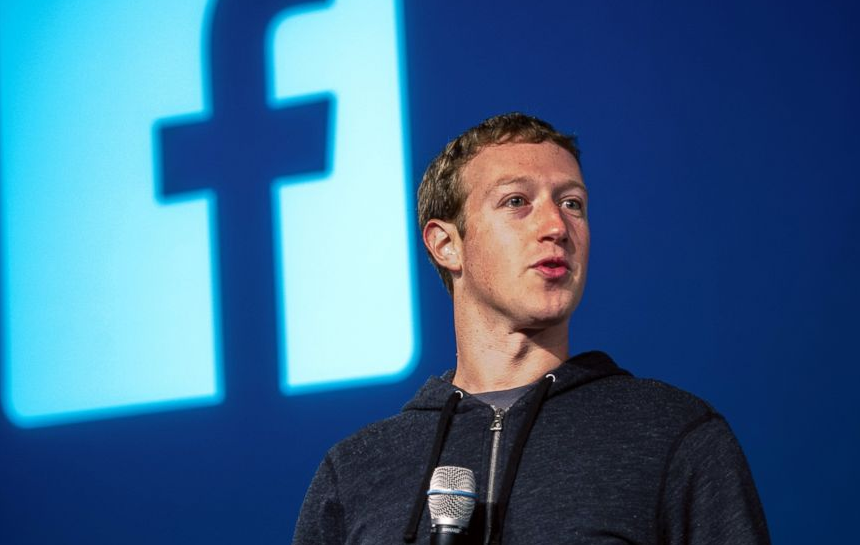
As usual, there are several reasons for the cold war between the web giants. Facebook launched a competing Graph search engine. Also, Larry Page didn’t help matters by saying that Facebook’s “doing a really bad job on their products.” And don’t forget about Google+ that, in spite of being heavily promoted by Googlers, didn’t become that popular with social media users.
No wonder, Google decided to shift its focus, and in 2014, Matt Cutts published another video telling webmasters that social signals––metrics such as Facebook likes and Twitter followers, which indicate a profile’s authority and influence––do not affect search rankings.
2015-2016, John Mueller: Again, social signals do not influence your ranking.
Starting from 2014, every several months, Google mentioned the topic of social signals and each time the answer was: “No, social signals are not used in search results ranking.”
Sometimes, however, the tone changed a bit, like in 2015, when John Mueller participated in a webmaster hangout and was asked, “Do Social Signals have an impact on organic rankings in Google?” The reply that followed was, “Not directly, no.”
In 2016, Gary Illyes confirmed that again on Twitter. The question was, "Some controversy over whether Google takes social into account for SEO — perhaps Louis Gray will settle this in our next session! #social16" Gary responded, "the short version is, no, we don't."
October 2017, Gary Illyes talks about the importance of brand sentiment.
At the State of Search event in 2017, Gary Illyes was quoted as saying that Google uses sentiment analysis for search rankings. Does that imply that mentions with negative sentiment can ruin your organic search rankings? Ah, as usual, there’s no direct answer to this question. At least, we can tell for sure that:
- Google’s looking at brand mentions on social media.
- Google’s trying to apply sentiment analysis.
- If the found data’s significant (say, hundreds of people complained about your product/service on Twitter within a day), Google might use it for ranking evaluation.
If you ask me, sentiment analysis may not be a huge ranking factor right now (due to crawl and machine learning limitations), but its importance is very likely to rise, as the technology grows.
So, are social media signals a ranking factor for Google? No, they are not a direct ranking factor at the moment. But they do have an indirect impact on search results, which is why SEOs should still care about social media marketing. Okay, enough with history and assumptions — let’s switch to the more entertaining practical part.
Part 2. How to use social for SEO (even though it’s not a “direct” ranking factor!)
When it comes to discussing ranking signals, Google’s keeping their cards close to their chest and things with social signals still look pretty complicated. Nonetheless, you shouldn’t ignore social in your digital marketing mix, because if you do, you can lose and lose big in a few years’ time. Let’s see how we can use the available social media data and resources to help your company grow and foster, both in organic search and on social media platforms.
1. You can earn real dofollow backlinks (which are a ranking signal!)
Almost everybody’s got a social media profile with dozens (or hundreds) of friends/connections/followers. Why is it important to SEO managers? Because by sharing site’s content across social media websites, you can earn real dofollow backlinks. How does that work?
Imagine you’ve just crafted a brand new post on how to plan and book your summer holiday in 2018. Then you share it on Facebook, Twitter, Instagram, you name it. You can even boost your post to reach more people. Then, if you did your homework well, the link will be picked up by bloggers, online magazines, and maybe some travel agencies. And in addition to retweets and likes, the post may earn real backlinks.
Well, this may be a bit utopic in 2018, as there’s too much content out there. Your site/blog should really stand out to get noticed. So, it won’t hurt to get some extra exposure.
Research influential users and companies and mention them in your content.
Yes, this work should be done before your post’s finished. In fact, this is something you need to be doing on a regular basis if you want your social media campaigns to be successful.
To discover the top influencers in your niche, you can do research using the search engines and social media networks, or gear up the process by creating a new alert in Awario.
After you type in the keywords and hashtags, let the tool collect mentions from all around the Web and build a list of influencers for you (could be found under Reports > Influencers):
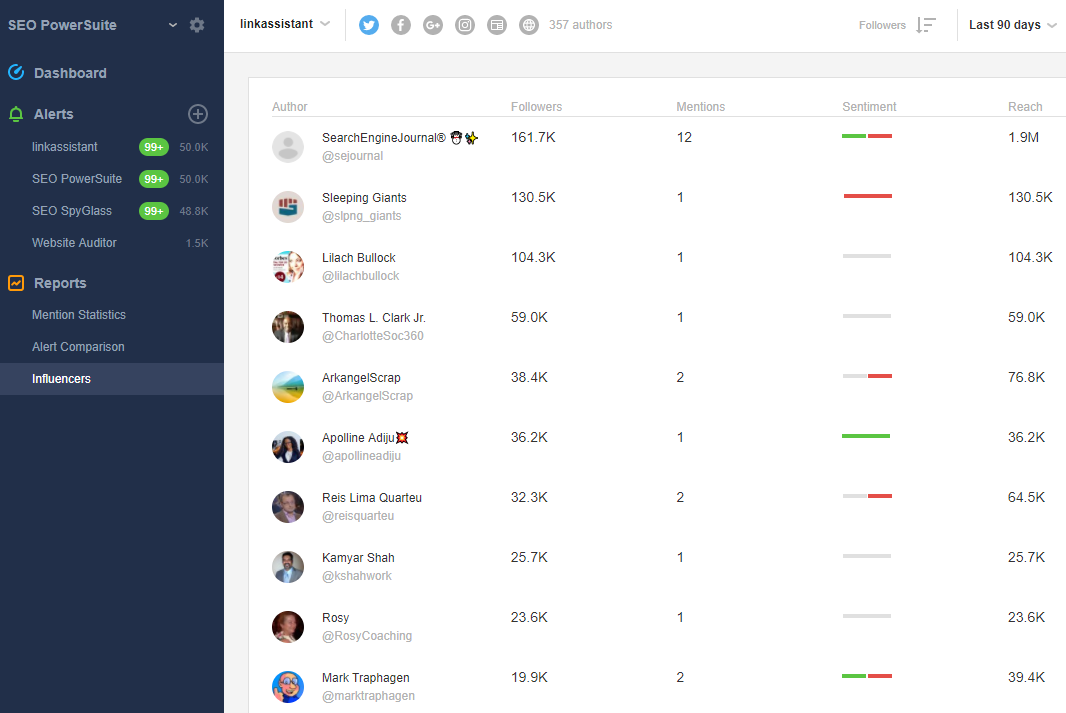
Choose the companies, websites, and profiles that appeal to you most and mention them in your content. If you don’t think they’ll notice you wrote about them, a bit of unobtrusive outreach may help. Do this regularly and monitor the number of backlinks - if it grows, you’re on the right track and social media will be doing a good job for your search rankings in the long run.
2. Linkless mentions could be equally important.
Okay, let’s say your post reached lots of people on social media and you got good traffic, but no links. Is it a bad result? Not necessarily. If you’ve been mentioned on other blogs and social profiles, this won’t stay unnoticed by the search engines and might help a lot with your rankings. And here’s why:
In September 2017, Gary Illyes mentioned in his keynote at Brighton SEO:
“If you publish high-quality content that is highly cited on the internet — and I’m not talking about just links, but also mentions on social networks and people talking about your branding, crap like that. Then you are doing great.”
If that’s not enough to convince you (yeah, we all remember how quickly Google changes its opinion!), take a look at something more meaningful, say Google’s patent. This Panda patent also refers to mentions, aka “implied links,” as a signal that could be equal in weight to the good old backlinks:
“The system determines a count of independent links for the group (step 302). […] Links for the group can include express links, implied links, or both. […] An implied link is a reference to a target resource, e.g., a citation to the target resource, which is included in a source resource but is not an express link to the target resource. Thus, a resource in the group can be the target of an implied link without a user being able to navigate to the resource by following the implied link.”
And even if that’s not enough, you can do some no-brainer research to make sure you’re on the right track with your activities.
First, you can take a look at your visibility (rankings) report using a tool like Rank Tracker:
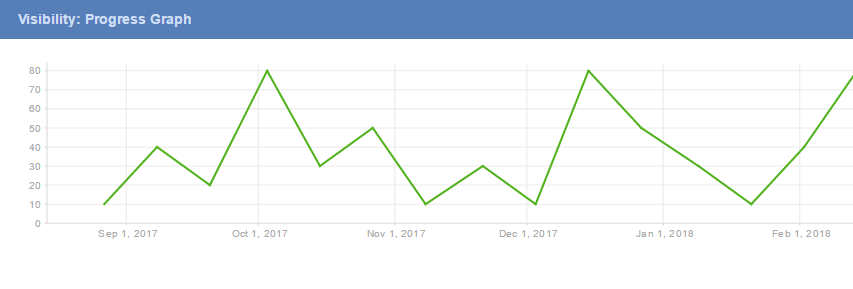
And then check your mentions’ statistics report in a social media monitoring tool like Awario:
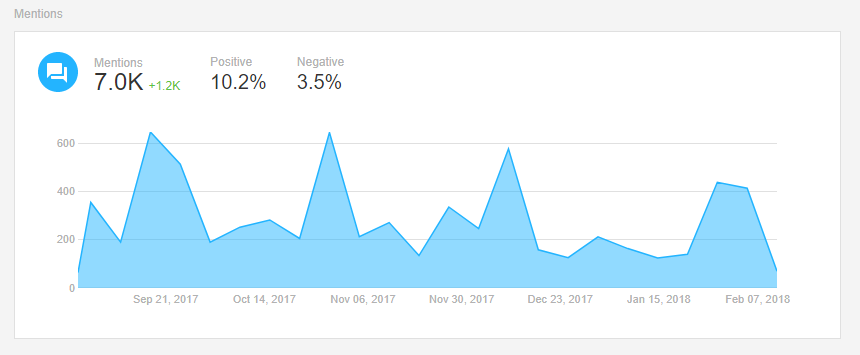
Does your site’s visibility grow together with the number of mentions? The stats will speak for themselves!
3. Social media profiles appear in Google’s search results.
Google your brand/product name and chances are high you’ll see your Twitter, and/or Facebook, and/or Instagram accounts on the first page. And if you’ve been active and popular on social media, the search engine results page may include more links to social media profiles than to any other types of websites:
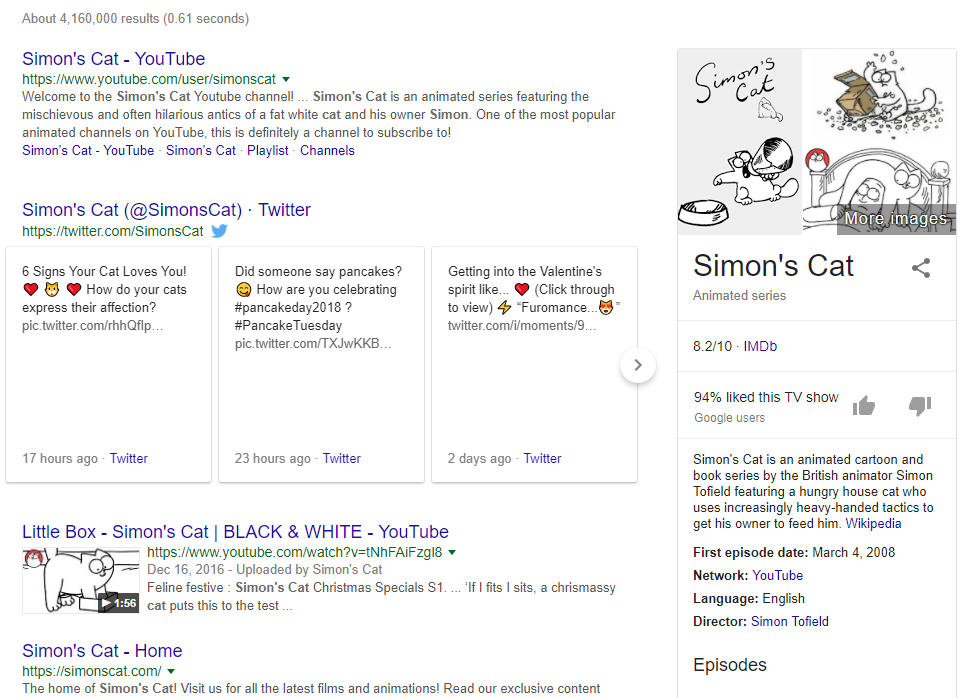
Even though Google may not care a lot about the number of social signals your site gets, it definitely cares about the content it serves to its users. Just think about it: your social media accounts can actually shape the content of search results!
And if Google thinks it’s important to showcase the “social” part of your company, you should make good use of it:
- Make sure your social media accounts include the most up-to-date company info, such as name, address, site’s URL.
- Check the quality of profile and cover images. Sometimes, these images will be the very first impression a person will get and can impact if they want to click your site’s link or not.
- Try to be responsive on social media — engage with users, promptly reply to questions and mentions, and do not ignore negative feedback.
The important thing here is that you should regularly work on the content for social media accounts - it should become a part of your content marketing mix.
4. Use social media for SEO-related research.
To do stellar SEO, we’re always in need of data - easy-to-rank keywords, content ideas, competition research - all these things impact how we plan optimization activities for any niche and website.
Now, guess what? We can get pretty interesting insights from social media websites.
I mentioned keyword ideas, but it’s better to say “questions-and-answers” ideas. With voice assistants conquering the world, search engines turn into “answer” engines. And where do people ask and answer questions most (apart from Google)? Yup, they are using social media websites to quickly collect ideas, tips, and feedback from their friends and acquaintances. So, if you’re able to spot those frequently asked questions on social media and create meaningful posts covering the topic in detail, you can make Googlebot fall in love with your website.
If you’re using Awario, you’ll be able to spot the related questions and discussions from all around the web within a single feed (and look specifically for questions by using the filtering option):

Now let’s take a look at your competitors’ social media profiles. Scroll down their Twitter and Facebook feeds and pay close attention to the posts with lots of engagement (retweets, shares, comments). Although you don’t have access to your competitors’ Google Analytics data, you can get an idea which articles resonated most with your target audience. Now all you have to do is some good old skyscraper technique — create a better, fresher, more detailed post and earn traffic and backlinks.
5. Other search engines, such as Bing, didn’t (publicly) say “no” to social signals.
Google may have changed their view of social signals being part of the ranking algorithm, but what about the rest of the search engines?
Back in 2010, Bing representatives stated that they looked at social media signals when generating search results:
“We do look at the social authority of a user. We look at how many people you follow, how many follow you, and this can add a little weight to a listing in regular search results. It carries much more weight in Bing Social Search, where tweets from more authoritative people will flow to the top when best match relevancy is used.”
And the interesting thing is that we’ve never heard them change their stance on social signals, which implies they may still be using them for ranking results. According to ComScore stats, Bing enjoyed around 33 percent market share in the US, so I think one shouldn’t ignore the second most used search engine in their SEO strategy.
The bottom line.
I’m strongly convinced that social media websites (the existing and the future platforms) will continue their growth worldwide, meaning there’ll be more and more data for search engines to collect and analyze. How they are going to use that data - remains a big question not only for marketers but probably for search companies too. But even now we can already tell that social media and SEO should be working together if business owners want to get the most of both.
What are your thoughts on social media and SEO? Do you think social signals will gain more weight in search rankings in the coming years? Feel free to share your thoughts in the comments below!













